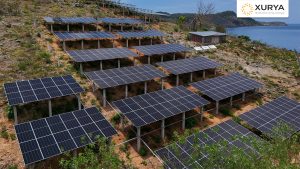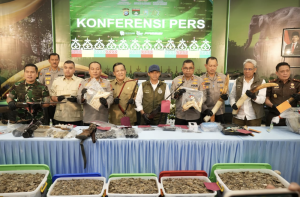Jakarta – President Prabowo Subianto’s ambitious target to achieve a 100 per cent energy mix from renewable sources (NRE) by 2035, according to a recent study by the Yayasan Kesejahteraan Berkelanjutan Indonesia (SUSTAIN), requires Rp 819.6 trillion in financing.
“This financing opportunity is real. We have fiscal space from the coal sector and also huge bilateral investment potential, especially from China,” said Tata Mustasya, SUSTAIN representative, Monday, 14 July.
According to SUSTAIN’s calculations, additional levies on coal production could contribute up to IDR 675.6 trillion to finance the energy transition between 2025 and 2034. This figure is derived from simulating several tariff scenarios, including volume-based levies and the global market price of coal.
“If the government has the courage to implement progressive levies, in line with the principles of energy justice and the shift to a green economy, then the fiscal contribution of the coal sector can become the main funding engine for renewable energy development,” Tata said.
The second source comes from bilateral investment, particularly through the Belt and Road Initiative (BRI) scheme, which is driven by China. Indonesia has been listed as the largest beneficiary of BRI in Southeast Asia, particularly in the energy and infrastructure sectors.
“We estimate the potential funding from Chinese partners in clean energy projects could reach Rp 144 trillion over the next decade,” Tata said.
NRE 2035 and NZE 2050 targets are closer together
The commitment to 100 per cent renewable energy by 2035 and net-zero emissions (NZE) by 2050 has been made directly by President Prabowo in several international forums, including his state visit to Brazil and the G20 meeting.
During these forums, Prabowo also mentioned a target of 75 Gigawatts (GW) of additional renewable energy generation capacity, in line with the revised national energy plan currently being prepared by the Ministry of Energy and Mineral Resources (MEMR).
However, according to SUSTAIN, the political statement must be immediately translated into concrete policies across sectors.
“The Ministry of Energy and Mineral Resources and the Ministry of Finance must work together. Fiscal and energy policies need to be structured on the basis of a fair and sustainable energy transition. It is not enough to have intentions; there must be a firm road map, incentives for the private sector, and social protection for people affected by the energy transition,” said Tata.
The SUSTAIN study also highlighted the need for the 2025-2034 General Plan for Electricity Supply (RUPTL) to be thoroughly overhauled to be more environmentally friendly. Currently, the share of renewable energy in the national electricity mix is still below 15 per cent – far from Prabowo’s 100 per cent target.
“The RUPTL has been too conservative towards renewable energy. The government needs to utilise this momentum to completely reverse the policy direction. Without RUPTL reform, the 2035 NRE target will only be a political promise,” Tata concluded. (Hartatik)
Banner photo: FotoIdee/shutterstock.com















